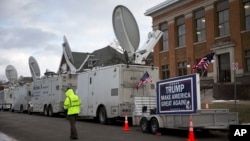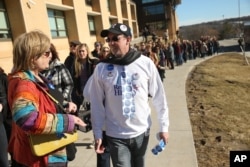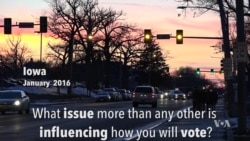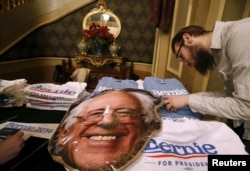Every four years, the residents of Iowa get the privilege of being the first in the nation to cast their votes in the U.S. presidential primary elections.
In the weeks leading up to the crucial Iowa caucuses, the massive U.S. political apparatus descends upon this largely rural Midwestern state of about 3 million people.
Presidential candidates and their campaign staffs, as well as journalists and pundits from around the globe, all set up camp here. With them, comes a nonstop flow of campaign ads on the radio, television, billboards, yard signs and fliers in the mail.
Pollsters, eager to measure public opinion, also bombard residents with phone calls and text messages.
Influential vote
Many Iowans are proud of their influential, first-in-the-nation status and are happily engaged in the democratic process, dutifully attending rallies, listening to candidates’ arguments and helping organize caucuses.
But others are just ready for everyone to go back to wherever they came from and leave them alone.
“It sucks, to be honest with you,” says Darren Zitterich who spoke with VOA while washing his clothes at a laundromat in Des Moines.
WATCH: Issues on Iowa voters' minds
“I feel like pulling my hair out, with all the commercials,” Zitterich says. “I swear there’s more commercials than TV shows.”
J.B. Scott, who is retired but works part time at a burger restaurant near Council Bluffs, also is exasperated. “I want my TV back,” he says.
“Or I want to mute it, at least. Because they bash each other like crazy, and who knows what the truth is anymore. Because it’s just one after the other, back-to-back-to-back,” Scott says.
Polling phone calls
Out in the more rural parts of Iowa, where landline telephones are more common, it’s the telephone calls from polling organizations that constantly target residents.
“During political season, you just know you’re going to have to answer the phone five times every night,” says James Uren, who owns a café in Elk Horn, Iowa.
“And the problem with that is that you just don’t get a chance to relax,” he says. “You can’t shut your brain off and recoup your system. You’re consistently answering somebody’s questions.”
For Patty, a Des Moines resident who didn’t want to give her last name, it’s the text messages that bother her most. “They even text my husband who doesn’t know how to text,” she says.
“We’ve told them five times that who they’re calling is not who they’re wanting. And they won’t take us off their list,” she says.
Looking forward to Tuesday
Patty says she’s looking forward to the caucuses being over late Monday evening, and all the outsiders leaving.
“Tuesday is going to feel so good, to wake up and not have to hear all that,” she says, before adding: “Except then we’ll have five days now of who won.”
In all, more than $70 million has been spent on political advertisements in Iowa during the primary election, according to the ad-tracking group SMG Delta.
And while it’s a demonstration of the success of the U.S. democratic system, for many it’s also a reminder that sometimes freedom of speech can also mean freedom to annoy.












